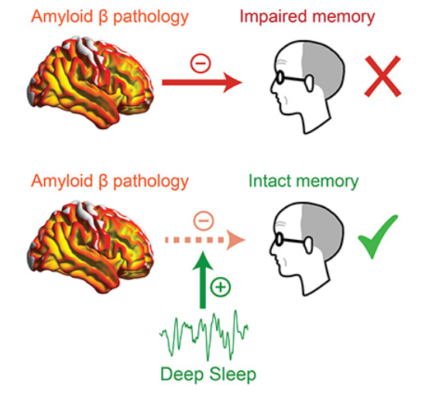Sleeping for Alzheimer’s, more Ozempic concerns, unnecessary beta-blockers, and more
05 May 2023
Posted by Andrew Kantor
Alzheimer’s drug — how big a deal?
Eli Lilly announced that its experimental anti-beta-amyloid drug donanemab cleared away brain plaque while patients “showed 35% less decline in thinking skills compared to those given a dummy drug.”
This is obviously big news. It doesn’t just show a chemical benefit, but a life-changing one. Approval may come later this year or early 2024; pricing hasn’t been set.
Caveats:
- The info was only in a press release, not trial results, so experts haven’t had a chance to pore over the details.
- At least two trial participants died, likely due to the drug. Will that deter patients? Probably not, but it might affect approval.
- On that same note, similar drugs have been linked to brain damage and other nasty side effects.
- The slowing of cognitive decline was important because it’s still not clear how much of a role beta-amyloid or tau plaques actually play in the disease.
Coming up fast: Spring Cleaning with Mollie
Now’s the perfect time to look ahead and give your pharmacy business the boost it needs to thrive.
This two-part virtual course will give you the tools you need (and the enthusiasm to use them!) to know where you are and where you want to be and then take smart, actionable, realistic steps to get there.
Each part is just an hour long — and gives 1 hour of CPE credit — but it’ll pay years of dividends.
- Part 1: Where Am I, and Where Do I Want to Be? — Wednesday, May 10; 7:00 – 8:00 pm via Zoom
- Part 2: How do I Get Where I’m Going? — Wednesday, May 17; 7:00 – 8:00 pm via Zoom
Each part is just $35 for GPhA members and $45 for non-members.
q
LINK IMAGE: https://www.gpha.org/springcleaning
Alzheimer’s: Beyond drugs
Go online, old man
An NYU study of 18,000 patients for up to 17 years found that, while 4.68% of participants were eventually diagnosed with dementia, “Regular internet usage was associated with approximately half the risk of dementia compared with non-regular usage. This link was found regardless of educational attainment, race-ethnicity, sex, and generation.”
… then go to sleep
A simple way to fight Alzheimer’s memory loss might be to get a good, deep sleep, at least according to UC Berkeley researchers.
Deep sleep, also known as non-REM slow-wave sleep, can act as a “cognitive reserve factor” that may increase resilience against a protein in the brain called beta-amyloid that is linked to memory loss caused by dementia.
In case that wasn’t clear, they provided this not-terribly helpful image:

Beta blockers may not make a difference
After a heart attack, the standard treatment is long-term beta blockers to prevent another. But — Swedish researchers say — that might be unnecessary as long as the patient doesn’t have heart failure.
They looked at the data for almost 44,000 people, 21% of whom weren’t prescribed beta blockers after a heart attack (i.e., the sample size was pretty darned good). Their finding:
The real time data showed that long term treatment with beta blockers wasn’t associated with improved cardiovascular outcomes during an average monitoring period of 4.5 years.
The difference was tiny:
- On beta blockers: 19% had another major heart problem
- Not on beta blockers: 22% had another major heart problem
“And after accounting for potentially influential factors […] there was no discernible difference in the rates of these events between the two groups.”
Link above is to the news story. The editorial in Heart is here (2-page PDF) and the paper itself is here (18-page PDF).
Weight-loss drugs in the news (again)
It’s a small(er) world after all
“Weight-loss drugs. There must be a new negative we can focus on,” said* the editors of the Atlantic. “We’re supposed to be the World’s Most Depressing Magazine™.”
“I know!” said* staff writer Sarah Zhang. “How about a story on how Ozempic can ruin a Disney vacation?”
“But Disney vacations are already nightmares if you’re over 12.”
“Yes, but Ozempic can make it worse.”
“You have our attention.”
Presenting: “Can You Have a Fun Vacation on Ozempic?”
* Not really. Well, probably not.
Speaking of Ozempic downsides…
Knowing the demand, makers of these drugs have set the price way, way high — and that means higher insurance premiums for employers if their plans cover the drugs.
Semaglutide — sold under the brand names Ozempic, Wegovy and Rybelsus — ranked fourth for total drug expenditures in the U.S. in 2021 at $10.7 billion, up 90% over the year before.
Some insurers have set up “gatekeeping tools” like BMI requirements or step therapy as, unlike bariatric surgery, these drugs aren’t once-and-done — they have to be paid for every month. That’s likely to be even more common as more GLP-1 drugs are approved.
Novo holds back supply
Novo Nordisk, is limiting new doses of Wegovy to existing patients — i.e., it won’t sell starter kits —“to ensure a steady supply for people already on the medication.”
Elsewhere: Drug drones to deliver
The University of Michigan’s Michigan Medicine is going to start (testing) drug delivery by drone next year, at least to patients within a 10-mile radius of one of its facilities.
The drones “will silently hover 300-feet above the ground” and lower their packages “on a tether that precisely delivers to their doorstep or balcony or other place of choice from the patient.”

Packaging mix-up with a 90-day supply


